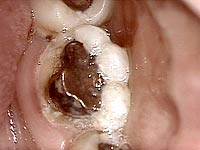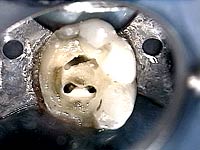

Before

After
Root Canal Therapy:
When Experience Counts
A severe toothache can be one of the most excruciating things our patients ever have to go through. When discomfort is at its worst, you need a dentist who can help you get out of pain as quickly as possible, while also preserving your tooth. You may need a root canal.
Endodontic therapy (“root canals”) are typically necessary when you have experienced something such as:
- A deep cavity that extends into the nerve of the tooth
- Dental abscesses (a “pimple” on the gum tissue)
- Past or recent trauma that has caused the tooth to die
- Severe pain or sensitivity
- A cracked tooth
- Discomfort when biting or chewing
Preserving the tooth from the inside-out can allow you to avoid unwanted extraction and future tooth replacement. A good glendora dentist will be able to carry out the procedure without losing the tooth unless the damage is too severe. Even though having it pulled may seem the best solution at hand, it is almost always in the best interest of your smile to retain your natural teeth.
The Treatment Experience
During a root canal, Dr. Brown will carefully numb the tooth and the area around it. Next, he will remove any damaged tooth structure, along with the diseased nerve inside of the inner tooth chamber. Finally, the inside of the chamber will be cleaned, medicated, and sealed off. It is the job of dentists, like those at the Thomas E. Cooke dentistry, to ease your mind before your root canal to make the whole experience as comfortable as possible for the patient.
After having a root canal, the tooth can become brittle and chip away from normal use. Placing a crown over the tooth can allow it to continue functioning normally. If this fails, many people choose to replace the tooth entirely with an implant. If this is the case, it is important to find an implant dentist in Washington DC, or indeed in your locale, that understands how best to carry out this procedure. It can also be possible to remove the tooth instead of undergoing the root canal and having an implant put in soon after.
Do Root Canals Hurt?
Endodontic treatment is inaccurately perceived as a painful experience. In reality, it is usually the swelling and infection causing the tooth pain, with the root canal being the remedy. As long as the area is properly numbed, you should not feel any discomfort during the treatment. Some mild soreness following the injection is to be expected.
With over 20 years of experience under his belt, Dr. Brown understands what it takes to help his patients feel comfortable during procedures like having a root canal. Here, you’re in good hands.
